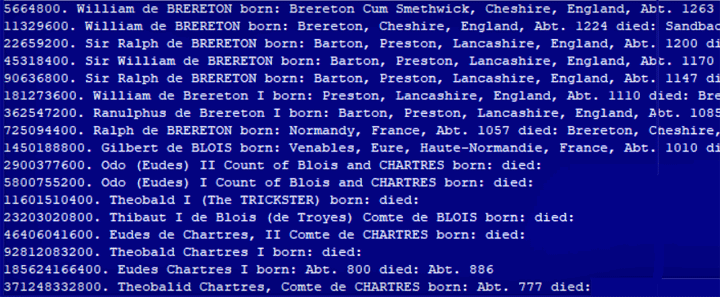Alert, there is a bug in my tool to convert text files to GEDCOMs: very large Ahnentafel numbers like “46406041600” will cause it to hang.
I will add code to ignore large numbers by May (end of this week). If you are a regular user of this tool, check this post for the update when the new feature is released.
Something must have changed on the collection of trees because I had three emails in the last week complaining that my tool hung and did not complete the conversion. In all cases, the Ahnentafel went up to extremely large numbers, so eliminating those last few lines fixed the problem
Here is an example of the last several lines of a file that did not work:

Here are the last few lines of the same file after removing the lines with very high numbers. This version worked.
Do you really need these people born in the 1200s? What is the probability that they even are actually your ancestors?
This appears to be some sort of limitation in either the storage space for the program or the number sizes. Thus I propose to modify the code to ignore ahnentafel numbers with more than seven digits and to have it tell you that it did that.
Any other ideas out there? Remember I make almost no money on this, just the occasional small thank you donation, so I am not looking for a solution that will take lots of my time.

It may be that your program is using a 32 bit integer, whose capacity is 2^31 for the ahnentafel number. If you switch that to be a 64 bit integer, it might fix the problem.
Great tool and I do not see this as a significant problem.
I very seldom work back in the 200 years after the Norman Conquest and my people do not extend further than 34 generations to 1066 so no higher than 17 billion (17×10^9), with many of mine born around 1066 being 7 generations closer. This limit gives room for a couple more generations.
And then I am off into what may well be more myth for me than fact.
I am in awe of anyone who has a firm grip on ancestors way back then, but for me they become a little unreal.
I even tend to think of Otes l’Archdeacon born Tintagel and mine and many other people’s link to Diana Princess of Wales as sounding a bit mythical, too.
Hello, Kitty
Can I ask you several matters in regards to working with Center Morgans on Genesis Gedmatch and Endogamous populations.
I’m doing DNA research and matching, triangulation to 1 or several common ancestors Referring to my European Ancestral lineages.
To start with, my prominent Ethinicity ( NZ – Polynesian ), my European lineages would only pertain to my parents X2 Great Grandparents. The problem that I have encountered with online websites like ancestry.com, myheritage, etc is endogamous noise between me and Hawaiian members. My main objective in this experiment is to deciphere the Hawaiian persons European portion of their DNA through their minimal related European DNA , that is working out the shared chromosomes, of which is endogamous and which ones are not.
Do you have any ideas as to how this can be achieved?.
You professionalism would so much appreciated by me.
Thanks
Kitty
Reece –
Endogamy is always a challenge. You might ask Kalani Monday for advice on his Hawaiin DNA blog at https://hawaiiandna.wordpress.com/about/
I would expect it is best to work with chromosome browsers, so 23andme, GEDmatch and MyHeritage.
23andme shows ethnicity by locations on the actual chromsomes so it is the most helpful site for that. The admix calculators at GEDmatch will also do that to some extent. The thought is to map your european segments so you know which ones you are looking for matches on.